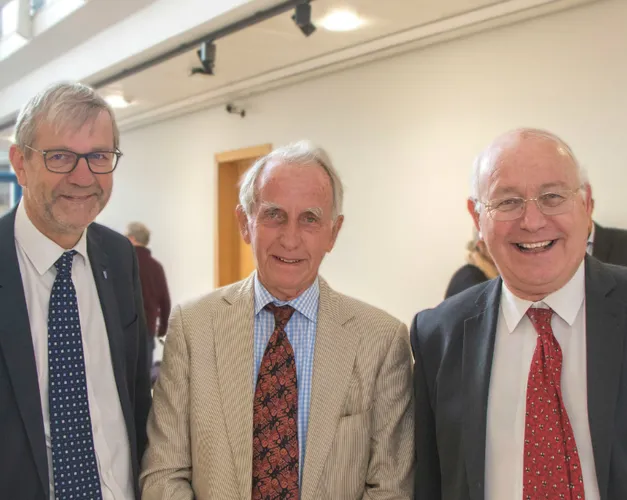News
Peter Garland (1934-2025)
Remembering Peter Garland, the University's first Professor of Biochemistry
Published on 7 March 2025

Pictured: Pete Downes, Peter Garland, and Philip Cohen.
It is with great sadness we share the news of the passing of Peter Garland, the first Professor of Biochemistry at the University of Dundee, who died peacefully in his sleep on Wednesday 5 March 2025 at the age of 91.
Peter was only 36 years old when he was appointed Professor and Head of the recently created Department of Biochemistry when it moved into the newly built Medical Sciences Institute in 1970. The embryonic department had no expertise in protein chemistry and so Peter's first two appointments as lecturers in 1971 were Derek Chignell and Philip Cohen.
Seven years later, Peter realised that the era of Molecular Biology and DNA cloning had dawned and that the University needed expertise in these key areas and so he appointed two more lecturers in this area, Christopher Higgins and David Lilley. His other appointments, made in the early 1980s, were David Boxer and Graham Hardie, who were already postdoctoral researchers in the department.
Peter Garland left Dundee in 1984, and the year after, the Department of Biochemistry was ranked the top department in the UK for research in this area. Three of Peter’s six appointees (Philip Cohen, Grahame Hardie, and David Lilley) were later elected Fellows of the Royal Society, the UK’s national academy of science, and all three still work and live in Dundee. David Boxer later became the Head of Biochemistry and then Vice-Principal at the University of Dundee, but after spending some years away as Director of the Institute of Food Research at the University of East Anglia, he has recently return to spend his retirement in Dundee.
Asked to comment on Peter Garland, David Lilley said, “I have many happy memories of Peter, who first appointed me in Dundee, and was extremely supportive of me as a young scientist in academia. Peter was a biochemist who was not afraid to think in novel and exciting ways. He developed new spectroscopic approaches, and indeed gently persuaded me to use fluorescence in a new and powerful way. Peter was way ahead of his time and was thinking about single-molecule spectroscopy long before most people. He is a great loss to science and will be sadly missed!”
Philip Cohen said, “I echo everything that David has said. Peter gave me my big chance as a Principal Investigator and supported me up to the hilt, even giving me some of his own research money when my first grant application failed. I owe a huge debt to him.”
Peter Brian Garland (Peter was affectionately referred to in the department as “PBG”) played a decisive role in the development of biomedical science at Dundee, and without him the School of Life Sciences as we know it today would not exist. Peter’s immense contribution to science in Dundee is remembered each year through the Peter Garland Lecture, the most important named lectureship in the School of Life Sciences. The Garland Cafeteria was named after him (which Peter found very amusing). He was awarded an honorary degree by the University in 1990.
Peter had a very successful subsequent career in industry and as Head of one of Britain’s largest cancer research institutes. After leaving Dundee, Peter became the Head of Research at Unilever’s Colworth Laboratories in Bedfordshire and then Head of Research at Amersham International until it was acquired by GE Healthcare.
Subsequently, he became Executive Director of the Institute for Cancer Research in London, a position he held until his retirement. He also played an important role as the Chair of Cambridge Antibody Technology (CAT) for many years. One of the UK’s most important biotechnology companies, CAT developed the drug Humira that has had a major impact on the treatment of Rheumatoid Arthritis and Crohn’s disease. Humira became the world’s top selling medicine with peak sales of over US$ 21 billion per annum in 2022. CAT is now a division of AstraZeneca, the UK’s largest company by market capitalisation.
We will continue to honour Professor Garland at the annual distinguished lecture in his name which has been held since 1985.